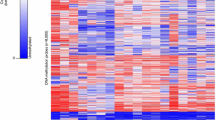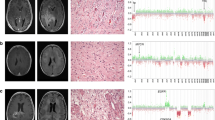Abstract
Gliomatosis cerebri (GC) is a rare tumor characterized by widespread infiltration of the brain and spinal cord. Although GC usually demonstrates histomorphological features of a low-grade tumor, the formation of secondary highly malignant tumor regions may occur. In order to reveal molecular genetic changes associated with tumor progression in GC, we analyzed factors known to be associated with malignant progression in common astocytomas in an unusual GC case of an 18-year-old patient suffering from this disease for almost 7 years. We detected allelic losses in the Rb gene and in exon 4 of the TP53 gene in a tumor region corresponding to a glioblastoma multiforme. EGFR or MDM2 gene amplifications were absent, and no PTEN mutation or allelic loss on chromosome 10 could be detected. Moreover, compared to tumor-free brain tissue of this patient, tumor regions showed increased EGFR expression. These findings show that malignant progression in GC might be associated with the acquisition of molecular genetic changes also found in low-grade astrocytomas with progression to secondary glioblastoma. These data support the notion that GC can be regarded as a subtype of a common astrocytoma.


Similar content being viewed by others
References
Kleihues P, Cavenee WK (2000) WHO Classification of tumours: Pathology and genetics of tumours of the nervous system. IARC Press, Lyon
Cummings TJ, Hulette CM, Longee DC, Bottom KS, McLendon RE, Chu CT (1999) Gliomatosis cerebri: cytologic and autopsy findings in a case involving the entire neuraxis. Clin Neuropathol 18:190–197
Mawrin C, Aumann V, Kirches E, Schneider-Stock R, Scherlach C, Vogel S, Mittler U, Dietzmann K, Krause G, Weis S (2001) Gliomatosis cerebri: post-mortem molecular and immunohistochemical analyses in a case treated with thalidomide. J Neurooncol 55:11–17
Schober R, Mai JK, Volk B, Wechsler W (1991) Gliomatosis cerebri: bioptical approach and neuropathological verification. Acta Neurochir (Wien) 113:131–137
Balko MG, Blisard KS, Samaha FJ (1992) Oligodendroglial gliomatosis cerebri. Hum Pathol 23:706–707
Tancredi A, Mangiola A, Guiducci A, Peciarolo A, Ottaviano P (2000) Oligodendrocytic gliomatosis cerebri. Acta Neurochir (Wien) 142:469–472
Jennings MT, Frenchman M, Shehab T, Johnson MD, Creasy J, LaPorte K, Dettbarn WD (1995) Gliomatosis cerebri presenting as intractable epilepsy during early childhood. J Child Neurol 10:37–45
Kannuki S, Hirose T, Horiguchi H, Kageji T, Nagahiro S (1998) Gliomatosis cerebri with secondary glioblastoma formation: report of two cases. Brain Tumor Pathol 15:111–116
Mawrin C, Lins H, Kirches E, Schildhaus HU, Scherlach C, Kanakis D, Dietzmann K (2003) Distribution of p53 alterations in a case of gliomatosis cerebri. Hum Pathol 34:102–106
Herrlinger U, Felsberg J, Küker W, Bornemann A, Plasswilm L, Knobbe CB, Strik H, Wick W, Meyermann R, Dichgans J, Bamberg M, Reifenberger G, Weller M (2002) Gliomatosis cerebri: molecular pathology and clinical course. Ann Neurol 52:390–399
Kros JM, Zheng P, Dinjens WNM, Alers JC (2002) Genetic aberrations in gliomatosis cerebri support monoclonal tumorigenesis. J Neuropathol Exp Neurol 61:806–814
Mawrin C, Kirches E, Schneider-Stock R, Scherlach C, Vorwerk C, von Deimling A, van Landeghem F, Meyermann R, Bornemann A, Mueller A, Romeike B, Stoltenburg-Didinger G, Wickboldt J, Pilz P, Dietzmann K (2003) Analysis of TP53 and PTEN in gliomatosis cerebri. Acta Neuropathol (Berl) 105:529–536
Kleihues P, Ohgaki H (1999) Primary and secondary glioblastomas: from concept to clinical diagnosis. Neurooncology 1:44–51
Mawrin C, Kirches E, Schneider-Stock R, Boltze C, Vorwerk CK, von Deimling A, Stoltenburg-Didinger G, Bornemann A, Romeike B, Sellhaus B, Dietzmann K (2005) Alterations of cell cycle regulators in gliomatosis cerebri. J Neurooncol 72:115–122
Schneider-Stock R, Mawrin C, Motsch C, Boltze C, Peters B, Hartig R, Buhtz P, Giers A, Rohrbeck A, Freigang B, Roessner A (2004) Retention of the arginine allele in codon 72 of the p53 gene correlates with poor apoptosis in head and neck cancer. Am J Pathol 164:1233–1241
Mawrin C, Kirches E, Boltze C, Dietzmann K, Roessner A, Schneider-Stock R (2002) Immunohistochemical and molecular analysis of p53, RB, and PTEN in malignant peripheral nerve sheath tumors. Virchows Arch 440:610–615
Foerster O, Gagel O (1934) Zentrale diffuse Schwannose bei Recklinghausenscher Krankheit. Z Gesamte Neurol Psychiatr 151:1–16
Nevin S (1938) Gliomatosis cerebri. Brain 61:170–191
Kluwe L, Friedrich RE, Mautner VF (1999) Allelic loss of the NF1 gene in NF1-associated plexiform neurofibromas. Cancer Genet Cytogenet 113:65–69
Henson JW, Schnitker BL, Correa KM, von Deimling A, Fassbender F, Xu HJ, Benedict WF, Yandell DW, Louis DN (1994) The retinoblastoma gene is involved in malignant progression of astrocytomas. Ann Neurol 36:714–721
James CD, Carlbom E, Dumanski JP, Hansen M, Nordenskjold M, Collins VP, Cavenee WK (1988) Clonal genomic alterations in glioma malignancy stages. Cancer Res 48:5546–5551
Thomas M, Kalita A, Labrecque S, Pim D, Banks L, Matlashewski G (1999) Two polymorphic variants of wild-type p53 differ biochemically and biologically. Mol Cell Biol 19:1092–1100
Dumont P, Leu JI, Della Pietra AC, George DL, Murphy M (2003) The codon 72 polymorphic variants of p53 have markedly different apoptotic potential. Nat Genet 33:357–365
Acknowledgments
We thank I. Schellhase, H. Scharfenort, T. Fuchs, and N. Duczmal for excellent technical assistance.
Author information
Authors and Affiliations
Corresponding author
Rights and permissions
About this article
Cite this article
Braeuninger, S., Schneider-Stock, R., Kirches, E. et al. Evaluation of molecular genetic alterations associated with tumor progression in a case of gliomatosis cerebri. J Neurooncol 82, 23–27 (2007). https://doi.org/10.1007/s11060-006-9245-7
Received:
Accepted:
Published:
Issue Date:
DOI: https://doi.org/10.1007/s11060-006-9245-7




